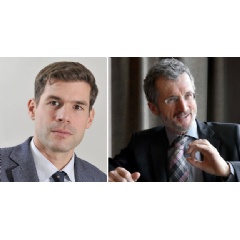Webwire
Bloomberg hosted two exclusive virtual roundtables with over 60 C-suite executives in Asia to discuss the future of ESG investing. The two keynote speakers were Georg Kell, Chairman of Arabesque & Founding Director of UN Global Compact and Wilhelm H Mohn, Head of Sustainability, Corporate Governance at Norges Bank Investment Management.
Both speakers discussed the evolving trends and growing importance of ESG globally, the impact of the COVID-19 pandemic on sustainable investing and the convergence between sustainable finance and responsible investing. Mr. Mohn’s intervention focused in particular on corporate sustainability reporting.
A green recovery?

L-R: Wilhem H Mohn & Georg Kell
Investors are increasingly focused on ESG principles, as the aspect of sustainability comes to the fore due to the global economic crisis stemming from the pandemic. According to Mr. Kell, crises present great opportunities for companies to rebalance and rebound. “Many corporations which go through deep crises situations have great opportunity to improve operations – they want to survive and grow. They want to live and improve and often they come out stronger,” he said. In particular, he felt that this current crisis is a question of months or years at the most, until a vaccine comes out. “Any corporation that looks ahead will recognize that this crisis is an opportunity to prepare for a strong rebound,” he added.
According to Mr. Mohn, “If you look at the actions taken by the EU promoting sustainable investment even pre-COVID, many are hopeful that the stage is set for a ‘green’ recovery.”
Balancing returns and sustainable investing
Even as the principle of sustainable investing gained ground globally, the perennial challenge of generating high returns remains. Mr. Mohn said that Norges Bank promotes long term value creation in companies that they invest in through dialogue. “We exist within certain parameters of acceptable ethical practice, so there are certain products that we don’t invest in and certain types of conduct by which we would exclude companies – we define expectations, and not targets,” he explained.
Speaking of his experience dealing with CEOs of large companies, Mr. Kell says that most of them are now paying more attention to sustainability to be ready for the future, and he is convinced that business models are fundamentally changing. “Best-run sustainable companies have leadership that relies on the agenda of sustainability: full integration of CEO, board, corporate culture, mindset; not just presence of sustainability departments,” he said.
Both speakers agreed that there is no easy fix to the issues stemming from multiple benchmarks and the lack of compatibility and correlation between leading agencies. However, they felt that over time the trend will move towards more real time data interpretation, and technology and artificial intelligence will play a key role.
Asia leading the way
Mr. Kell felt that Asia is leading the world on many aspects of sustainable investing. “Personally, I took many ideas from Singapore to New York. Asia has a great combination of demographics, natural resources and optimism about the future. In terms of governance, Asian countries managed the crisis better, and I believe crisis is a historic test,” he said.
Mentioning that various markets in Asia are in different levels of evolution when it comes to sustainable investing, Mr. Mohn said Norges Bank’s experience has been very fruitful and engaging with most companies that they have dealt with in Asia.

